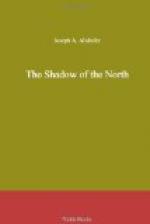Another low hill and from its summit he saw nothing but the bushy wilderness, with a strip of forest appearing on the sunken horizon. He searched the sky for a wisp of smoke that might tell of a human habitation, below, but saw none. Yet people might live beyond the strip of forest, where the land would be less sandy and more fertile, and, after a brief rest, he pushed on with the same vigor of the body and elation of the spirit, coming soon to firmer ground, of which he was glad, as he now left no trail, at least none that an ordinary white man could follow.
He trudged bravely on for hours through a wilderness that seemed to be complete so far as man was concerned, although its character steadily changed, merging into a region of forest and good soil. When he came into a real wood, of trees large and many, it was about noon, and finding a comfortable place with his back to a tree he ate from the precious pack.
The day was still brilliant but cold and he wisely kept himself thoroughly wrapped in the greatcoat. As he ate he saw a large black bear walk leisurely through the forest, look at him a moment or two, and then waddle on in the same grave, unalarmed manner. The incident troubled Robert, and his high spirits came down a notch or two.
If a black bear cared so little for the presence of an armed human being then he could not be as near to New York as he had thought. Perhaps he had been unconscious on the schooner a long time. He felt of the lump which was not yet wholly gone from his head, and tried his best to tell how old it was, but he could not do it.
The little cloud in his golden sky disappeared when he rose and started again through a fine forest. His spirits became as high as ever. Looking westward he saw the dim blue line of distant hills, and he turned northward, inferring that New York must lie in that direction. In two hours his progress was barred by a river running swiftly between high banks, and with ice at the edges. He could have waded it as the water would not rise past his waist, but he did not like the look of the chill current, and he did not want another wetting on a winter day.
He followed the stream a long distance, until he came to shallows, where he was able to cross it on stones. His search for a dry ford had caused much delay, but he drew comfort from his observation that the stones making his pathway through the water were large and almost round. He had seen many such about New York, and he had often marveled at their smoothness and roundness, although he did not yet know the geological reason. But the stones in the river seemed to him to be close kin to the stones about New York, and he inferred, or at least he hoped, that it indicated the proximity of the city.




